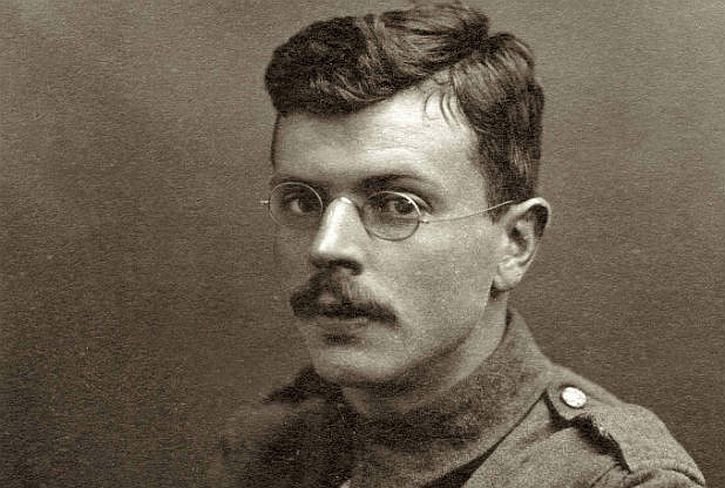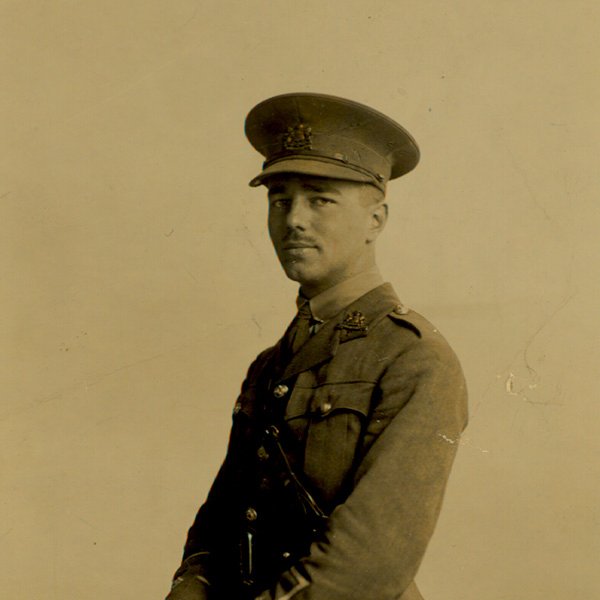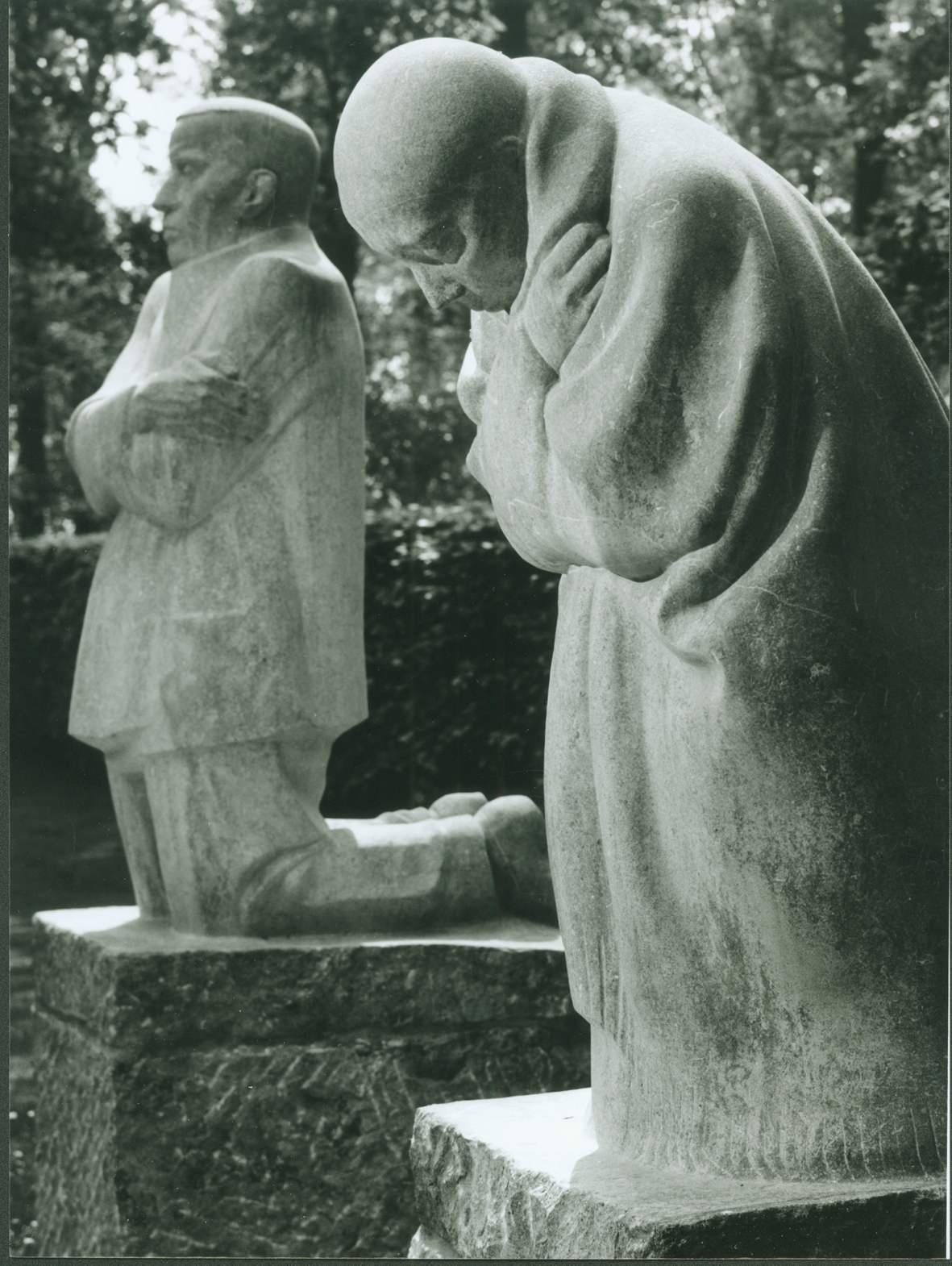Poetry of the First World War
Below is a small selection of poems from the First World War. Links to further poems and archives are at the end of the page.
Ivor Gurney
Strange Service
Little did I dream, England, that you bore me
Under the Cotswold hills beside the water meadows,
To do you dreadful service, here, beyond your borders
And your enfolding seas.
I was a dreamer ever, and bound to your dear service,
Meditating deep, I thought on your secret beauty,
As through a child's face one may see the clear spirit
Miraculously shining.
Your hills not only hills, but friends of mine and kindly,
Your tiny knolls and orchards hidden beside the river
Muddy and strongly flowing, with shy and tiny streamlets
Safe in its bosom.
Now these are memories only, and your skies and rushy sky-pools
Fragile mirrors easily broken by moving airs ...
But deep in my heart for ever goes on your daily being,
And uses consecrate.
Think on me too, O Mother, who wrest my soul to serve you
In strange and fearful ways beyond your encircling waters;
None but you can know my heart, its tears and sacrifice;
None, but you, repay.
Ivor Gurney
The Stokes Gunners
When Fritz and we were nearly on friendly terms—
Of mornings, furtively, (O moral insects, O worms!)
A group of khaki people would saunter into
Our sector and plant a stove-pipe directed on to
Fritz trenches, insert black things, shaped like Ticklers jams—
The stove pipe hissed a hundred times and one might count to
A hundred damned unexpected explosions,
Which was all very well, but the group having finished performance
And hissed and whistled, would take their contrivance down to
Head quarters to report damage, and hand in forms
While the Gloucesters who desired peace or desired battle
Were left to pay the piper—Cursing Stokes to Hell, Montreal and Seattle.
(1925)
Ivor Gurney
Bach and the Sentry
Watching the dark my spirit rose in flood
On that most dearest Prelude of my delight.
The low-lying mist lifted its hood,
The October stars showed nobly in clear night.
When I return, and to real music-making,
And play that Prelude, how will it happen then?
Shall I feel as I felt, a sentry hardly waking,
With a dull sense of No Man's Land again?
Eleanor Farjeon
Now that you too must shortly go
Now that you too must shortly go the way
Which in these bloodshot years uncounted men
Have gone in vanishing armies day by day,
And in their numbers will not come again:
I must not strain the moments of our meeting
Striving for each look, each accent, not to miss,
Or question of our parting and our greeting,
Is this the last of all? is this—or this?
Last sight of all it may be with these eyes,
Last touch, last hearing, since eyes, hands, and ears,
Even serving love, are our mortalities,
And cling to what they own in mortal fears:—
But oh, let end what will, I hold you fast
By immortal love, which has no first or last.
Eleanor Farjeon
Peace
I.
I am as awful as my brother War,
I am the sudden silence after clamour.
I am the face that shows the seamy scar
When blood has lost its frenzy and its glamour.
Men in my pause shall know the cost at last
That is not to be paid in triumphs or tears,
Men will begin to judge the thing that’s past
As men will judge it in a hundred years.
Nations! whose ravenous engines must be fed
Endlessly with the father and the son,
My naked light upon your darkness, dread!—
By which ye shall behold what ye have done:
Whereon, more like a vulture than a dove,
Ye set my seal in hatred, not in love.
II.
Let no man call me good. I am not blest.
My single virtue is the end of crimes,
I only am the period of unrest,
The ceasing of the horrors of the times;
My good is but the negative of ill,
Such ill as bends the spirit with despair,
Such ill as makes the nations’ soul stand still
And freeze to stone beneath its Gorgon glare.
Be blunt, and say that peace is but a state
Wherein the active soul is free to move,
And nations only show as mean or great
According to the spirit then they prove.—
O which of ye whose battle-cry is Hate
Will first in peace dare shout the name of Love?
(1918)
Eleanor Farjeon (1881-1965)
Wilfred Owen
Futility
Move him into the sun—
Gently its touch awoke him once,
At home, whispering of fields half-sown.
Always it woke him, even in France,
Until this morning and this snow.
If anything might rouse him now
The kind old sun will know.
Think how it wakes the seeds—
Woke once the clays of a cold star.
Are limbs, so dear-achieved, are sides
Full-nerved, still warm, too hard to stir?
Was it for this the clay grew tall?
—O what made fatuous sunbeams toil
To break earth's sleep at all?
Wilfred Owen
Anthem for Doomed Youth
What passing-bells for these who die as cattle?
— Only the monstrous anger of the guns.
Only the stuttering rifles' rapid rattle
Can patter out their hasty orisons.
No mockeries now for them; no prayers nor bells;
Nor any voice of mourning save the choirs,—
The shrill, demented choirs of wailing shells;
And bugles calling for them from sad shires.
What candles may be held to speed them all?
Not in the hands of boys, but in their eyes
Shall shine the holy glimmers of goodbyes.
The pallor of girls' brows shall be their pall;
Their flowers the tenderness of patient minds,
And each slow dusk a drawing-down of blinds.
Wilfred Owen
Disabled
He sat in a wheeled chair, waiting for dark,
And shivered in his ghastly suit of grey,
Legless, sewn short at elbow. Through the park
Voices of boys rang saddening like a hymn,
Voices of play and pleasure after day,
Till gathering sleep had mothered them from him.
About this time Town used to swing so gay
When glow-lamps budded in the light-blue trees,
And girls glanced lovelier as the air grew dim,—
In the old times, before he threw away his knees.
Now he will never feel again how slim
Girls' waists are, or how warm their subtle hands,
All of them touch him like some queer disease.
There was an artist silly for his face,
For it was younger than his youth, last year.
Now, he is old; his back will never brace;
He's lost his colour very far from here,
Poured it down shell-holes till the veins ran dry,
And half his lifetime lapsed in the hot race
And leap of purple spurted from his thigh.
One time he liked a blood-smear down his leg,
After the matches carried shoulder-high.
It was after football, when he'd drunk a peg,
He thought he'd better join. He wonders why.
Someone had said he'd look a god in kilts.
That's why; and maybe, too, to please his Meg,
Aye, that was it, to please the giddy jilts,
He asked to join. He didn't have to beg;
Smiling they wrote his lie: aged nineteen years.
Germans he scarcely thought of, all their guilt,
And Austria's, did not move him. And no fears
Of Fear came yet. He thought of jewelled hilts
For daggers in plaid socks; of smart salutes;
And care of arms; and leave; and pay arrears;
Esprit de corps; and hints for young recruits.
And soon, he was drafted out with drums and cheers.
Some cheered him home, but not as crowds cheer Goal.
Only a solemn man who brought him fruits
Thanked him; and then inquired about his soul.
Now, he will spend a few sick years in institutes,
And do what things the rules consider wise,
And take whatever pity they may dole.
Tonight he noticed how the women's eyes
Passed from him to the strong men that were whole.
How cold and late it is! Why don't they come
And put him into bed? Why don't they come?
Wilfred Owen
Smile, Smile, Smile
Head to limp head, the sunk-eyed wounded scanned
Yesterday's Mail; the casualties (typed small)
And (large) Vast Booty from our Latest Haul.
Also, they read of Cheap Homes, not yet planned;
’For’, said the paper, ‘when this war is done
The men's first instinct will be making homes.
Meanwhile their foremost need is aerodromes,
It being certain war has just begun.
Peace would do wrong to our undying dead,—
The sons we offered might regret they died
If we got nothing lasting in their stead.
We must be solidly indemnified.
Though all be worthy Victory which all bought.
We rulers sitting in this ancient spot
Would wrong our very selves if we forgot
The greatest glory will be theirs who fought,
Who kept this nation in integrity.’
Nation?—The half-limbed readers did not chafe
But smiled at one another curiously
Like secret men who know their secret safe.
(This is the thing they know and never speak,
That England one by one had fled to France
Not many elsewhere now save under France).
Pictures of these broad smiles appear each week,
And people in whose voice real feeling rings
Say: How they smile! They're happy now, poor things.
Wilfred Owen (1893–1918)
Source: Poetry Foundation (US)
Links
Ivor Gurney Society, manuscripts.
Tim Kendall on Ivor Gurney.
Ivor Gurney biography and poems at the Poetry Foundation (US).
First World War Poetry digital archive.
Wilfred Owen biography and poems at the Poetry Foundation (US).
Rudyard Kipling, ‘Mary Postgate’ (1915), on Kipling Society website. This story can also be found in the story collection, A Diversity of Creatures.
Great War Fiction blog by George Simmers
Brian Clayton, English Association pamphlet on Women and the First World War (2014)
Poppies photo: Shokoofeh Poorreza, Unsplash
Käthe Kollwitz, Die trauendern Eltern
(The grieving parents)




